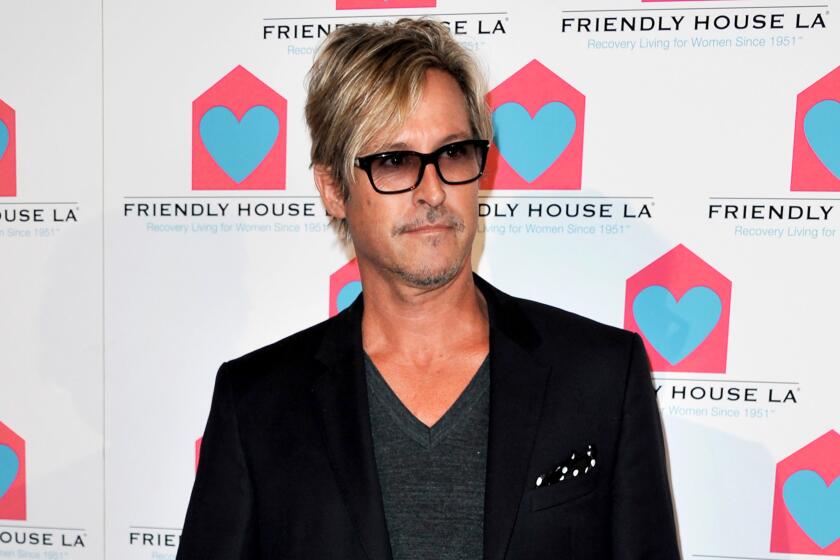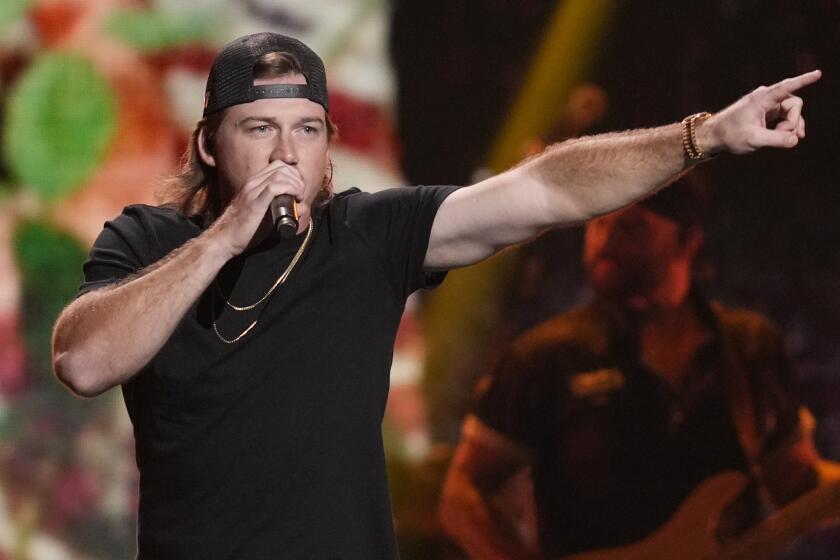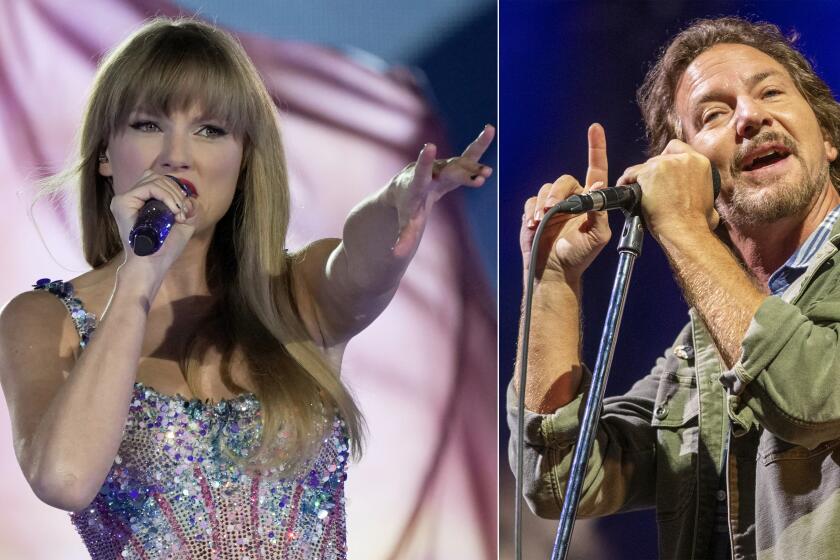Q&A; with : ‘I Don’t Like to Be Corralled or Fenced In’
Wynonna, Trisha, Pam--they keep coming in waves, but no one has been able to dislodge Reba McEntire from her position as country music’s preeminent female artist.
Combining show-biz flamboyance with down-home roots, the Oklahoma native has lately made a specialty of songs whose themes tap social issues in dramatic fashion. Susan Longacre and Rick Giles’ “Is There Life Out There?,” which was adapted into a CBS TV movie last year, depicts a woman returning to college in midlife. In her recent hit “I Think His Name Was John,” written by Sandy Knox and Steve Rosen, a scrupulous woman recalls the careless slip that left her with AIDS.
McEntire, who published her autobiography last year (“My Story”), also conducts a nascent acting career (she was in the recent TV movie “Buffalo Gals”) and operates a diverse business empire with her husband and manager Narvel Blackstock.
McEntire--the only female nominee for entertainer of the year in the Academy of Country Music Awards, which will be televised by NBC tonight from the Universal Amphitheatre--talked last week about her tireless pace and her approach to music.
*
Question: In addition to recording and touring, you’ve written your autobiography, you’re acting--what motivates all this activity?
Answer: Well, I hate to be bored, for one thing, and I like to see what other things I can get involved in. I like to keep thinkin’ up new things, see what we can do. It just makes it more fun.
Q: Isn’t just the music enough of a challenge?
A: Well, see, that’s what you do the other things for too, is to help you improve and grow. And if it’s a movie or a book, that just broadens your audience and it makes more people aware of you. . . . It helps to show a different side of you.
Q: You’ve been criticized for the pop leanings of your music. What’s your philosophy on traditional country versus pop?
A: I don’t like to be categorized. I don’t like to be corralled or fenced in. I think there’s only two categories for songs: good and bad. And whether it’s pop, contemporary, traditional, whatever it is, once I sing it, it’s gonna be country. It may have a pop arrangement, it may have a very traditional arrangement, but vocally it’s gonna be country. But that helps me to stretch out, and I think it makes it more interesting for my audience.
Q: Along the same lines, do you ever worry that all the production in your live show will overshadow the music?
A: Oh, I get criticized about that a lot. . . . When I go see a stage show I want to be totally entertained, like a circus. . . . So that’s the show I like to give. I would not be happy just standing up behind a microphone and singing. . . . Usually the sound at big venues is not the greatest in the world. I’d say 75% of the audience goes to a concert for the visual aspect more than the sound.
Q: You’ve become identified with songs that deal with issues in people’s lives, like the woman returning to school in “Is There Life Out There?” and AIDS in “I Think His Name Was John.” Why do you do songs like that?
A: I think if I can sing about it, people can relate to it, and if they’re in the situation the songs depict, then I think they can talk about it and bring light into the situation. That way, the darkness disappears. It doesn’t seem quite as bad, or maybe there’s a solution to be found if they’re talking about it. Maybe they need some help. Maybe it’s just discussing it with a friend or their spouse.
Q: There haven’t been any country songs dealing with AIDS. Did you have any hesitation about recording “John”?
A: None. . . . The thing I find so interesting about that song is that the younger generation, 10- to 20-year-old people, will understand that song 100 times faster than adults. Because we’re talking about their future, their existence.
The things that we took for granted--I’m 40, and all the problems with sex, we could go cure with a shot. Well, they can’t. And the fun times that we thought was the most exciting thing in the world, that’s life-threatening to them. My heart goes out to them. But something’s gotta jerk their chain and say, “You gotta quit being so promiscuous.” If this song will make somebody stop and think, then the song was worth recording.
Q: Do you get lots of reaction to songs like that?
A: Tons. It’s surprising how many people respond to those kind of songs. I mean, it changes their life. Women tell me all the time at our concerts that because of “Is There Life Out There?”--the video, song and the movie--they’ve gone back to school. They got their kids raised and everything, and that movie (aired) and they went back to college, because of a song. I tell the songwriters all the time they have no idea how many lives they’ve touched and improved.
Q: You’re the only woman up for entertainer of the year in the ACM Awards this year. Do you think women are still struggling for equality with men in the country field?
A: I think a person has to get away from the gender. I think they have to just say, “I’m gonna work hard, I’m gonna do the best I can.” Not only are the women in competition with the men, but they’re in competition with all sorts of forms of entertainment. Basketball games, movies, rock ‘n’ roll. So it takes a lot of hard work and energy to make sure that you put on the best show possible, that when your show comes to town and it’s either you or a basketball game, they say, “Man, let’s go see Reba.”
So I don’t think you can say women have a hard time and they get less breaks than a man. You just gotta belly up to the bar and work harder. That’s all you can do.
More to Read
The biggest entertainment stories
Get our big stories about Hollywood, film, television, music, arts, culture and more right in your inbox as soon as they publish.
You may occasionally receive promotional content from the Los Angeles Times.






